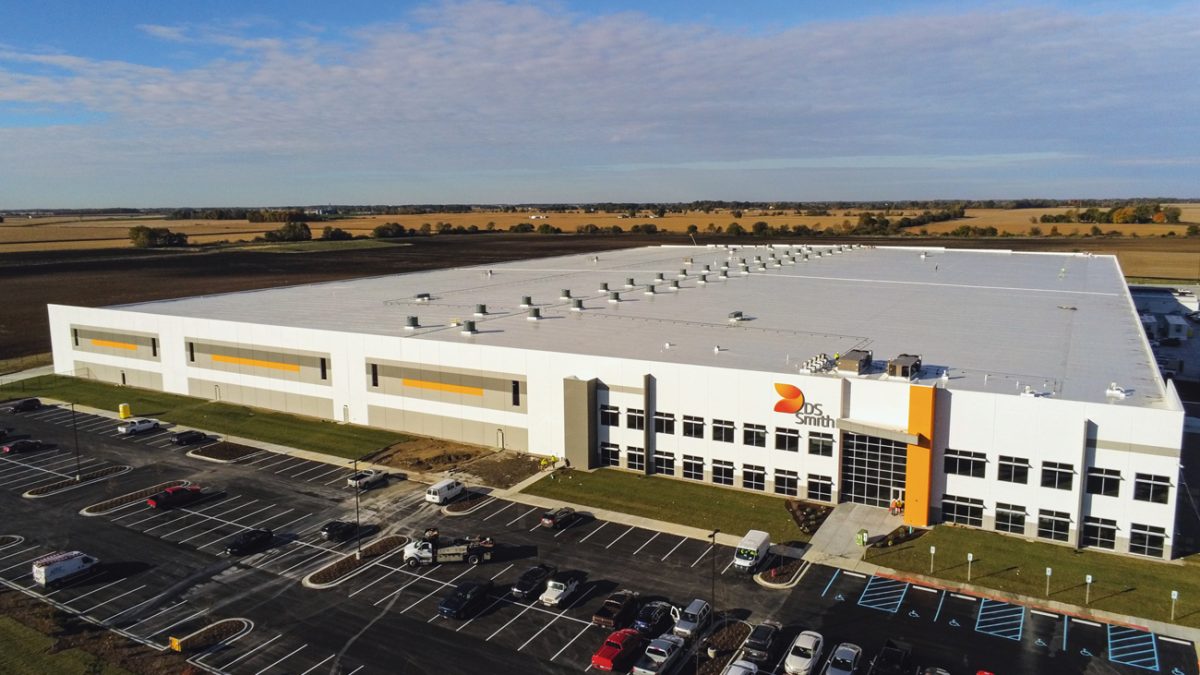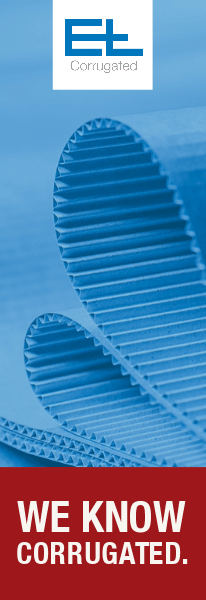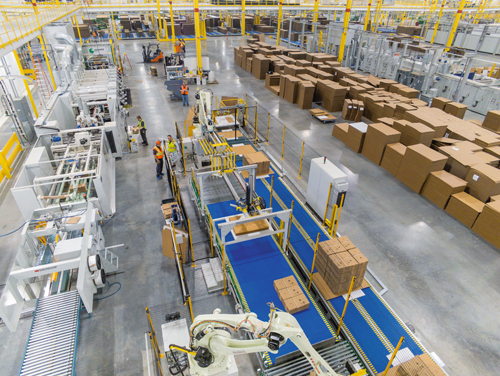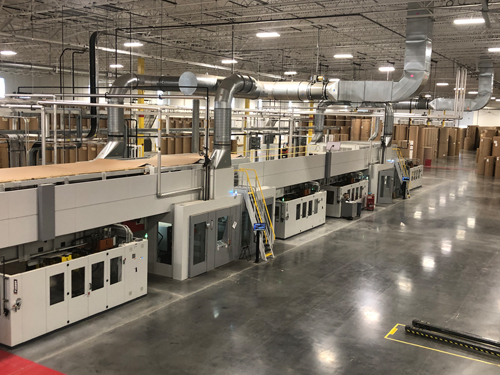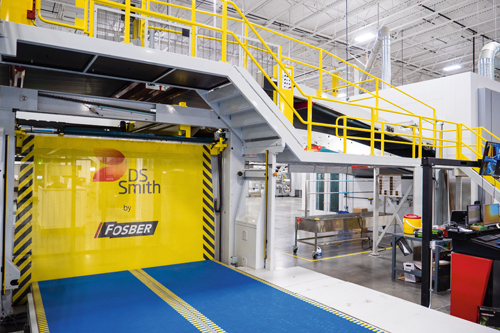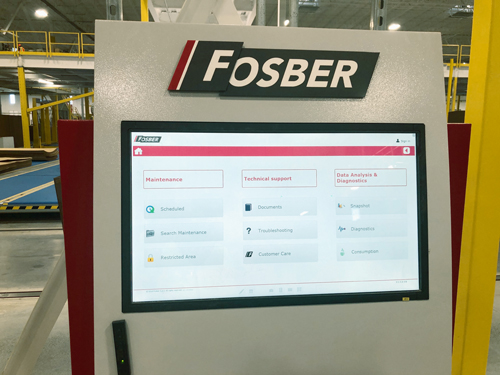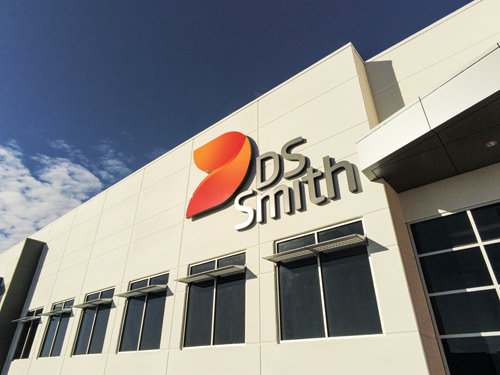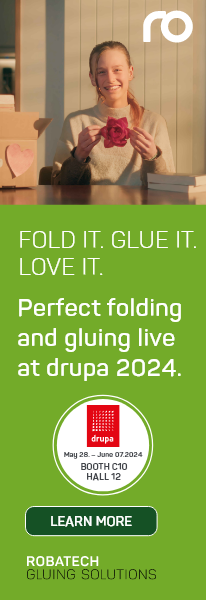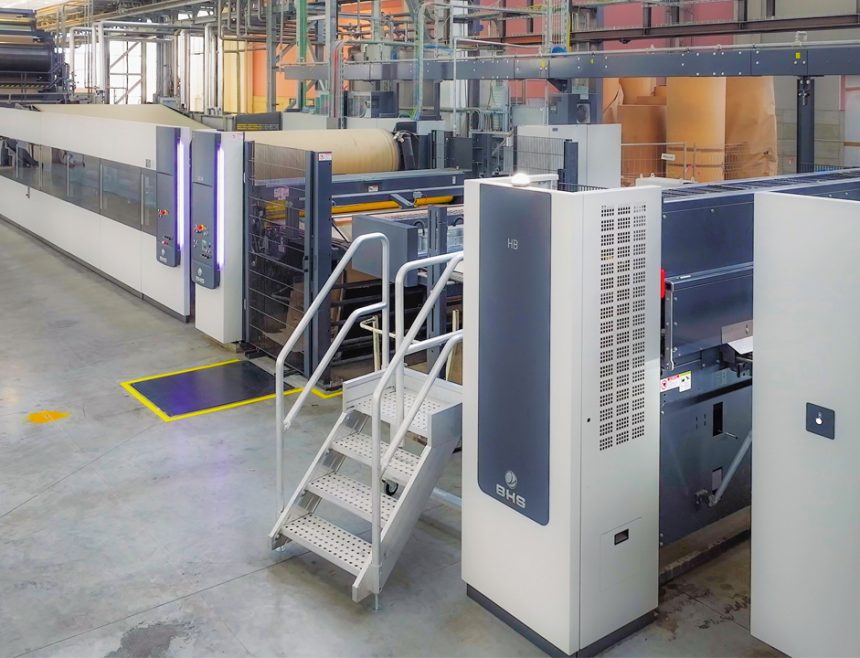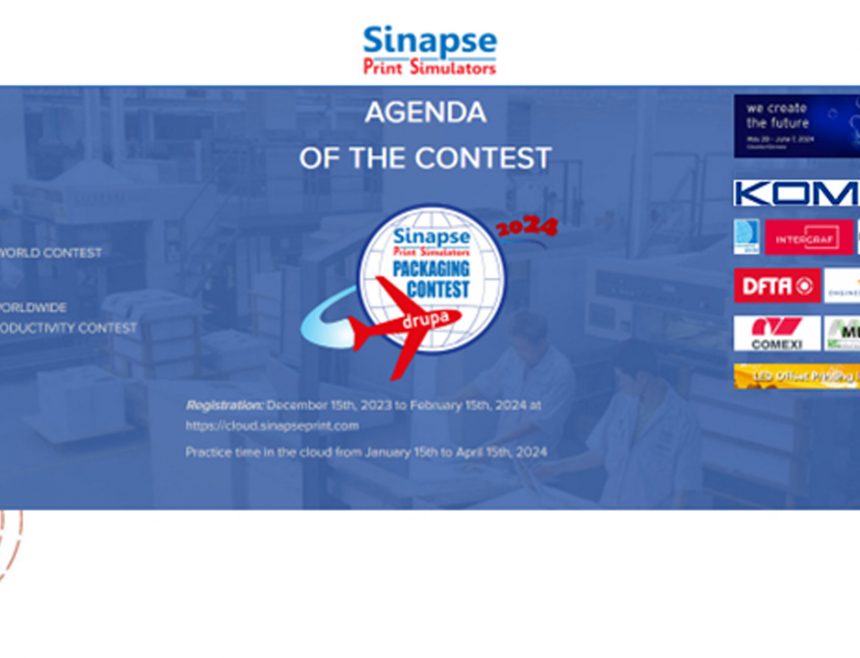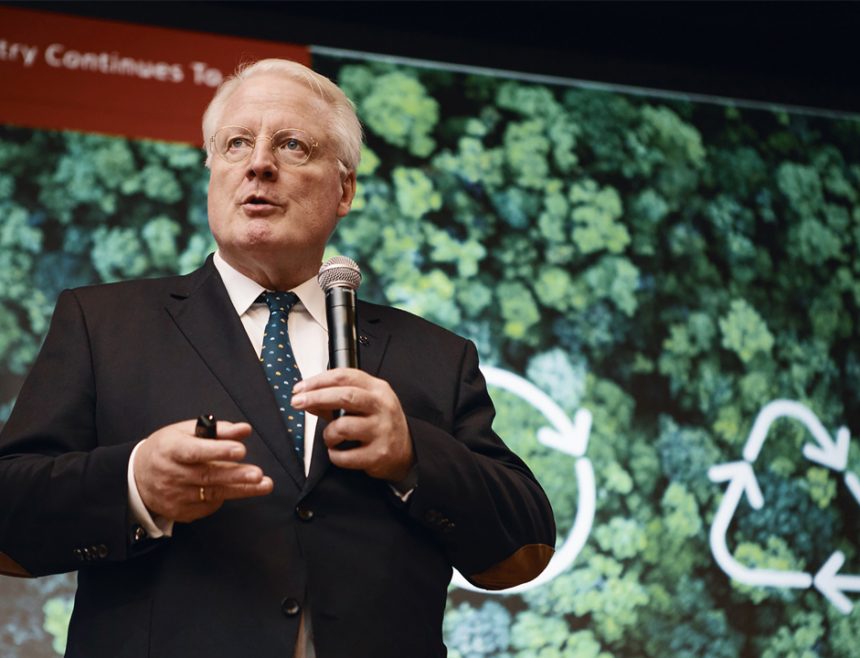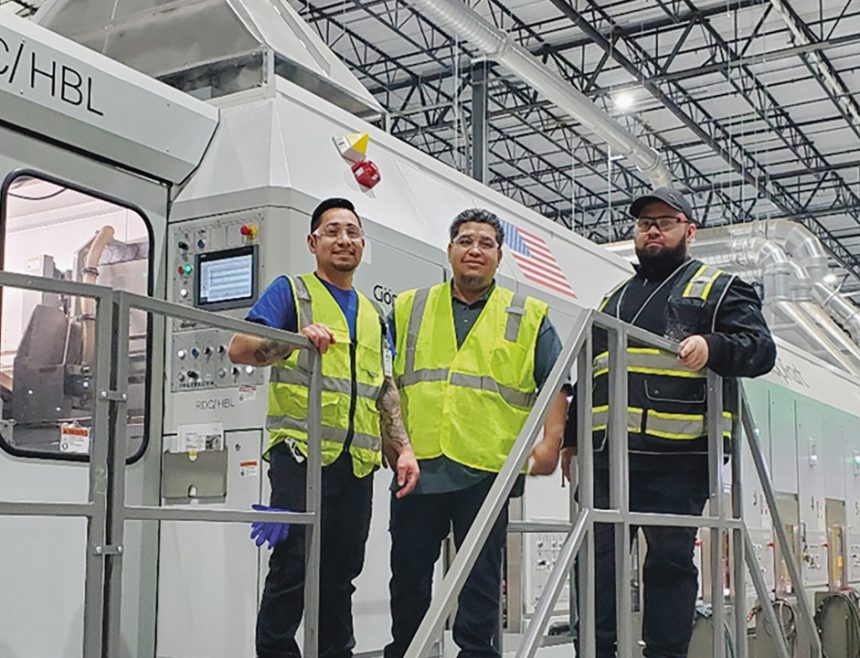Just three years after entering the U.S. corrugated market, DS Smith, an international packaging business headquartered in London, has strengthened its foothold with the opening of a 52,000 sqm (550,000 sq ft) facility in Lebanon, Ind. Located about 50km northwest of Indianapolis, the plant started up in January.
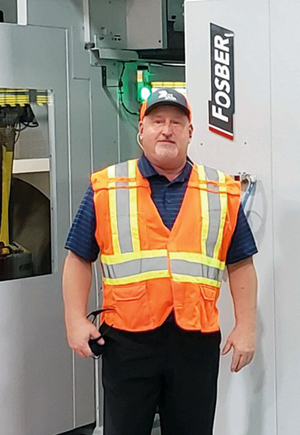 It was designed to model three DS Smith locations in Europe that are highly automated, customer-centric plants which can accept and process high-volume orders with short lead times – many with same-day turnaround. The plant produces flexo (up to four colours), digital or pre-printed corrugated packaging primarily for the FMCG (fast-moving consumer goods) sector. The top markets include food, beverage, pet care and beauty products. Its location and proximity to major interstate highways is ideal for serving customers and brands with distribution centres primarily in the Chicago, Columbus, Cincinnati, St. Louis and Nashville markets.
It was designed to model three DS Smith locations in Europe that are highly automated, customer-centric plants which can accept and process high-volume orders with short lead times – many with same-day turnaround. The plant produces flexo (up to four colours), digital or pre-printed corrugated packaging primarily for the FMCG (fast-moving consumer goods) sector. The top markets include food, beverage, pet care and beauty products. Its location and proximity to major interstate highways is ideal for serving customers and brands with distribution centres primarily in the Chicago, Columbus, Cincinnati, St. Louis and Nashville markets.
Currently, there are 108 employees working two shifts, with plans to expand to 180 employees and three shifts, according to David McCracken, (pictured left) Business Unit General Manager of Box Plants & PrePrint. McCracken joined DS Smith about two and a half years ago and is responsible for four plants. He has 37 years of industry experience working for both independent and integrated plants.
300,000 Boxes An Hour
DS Smith entered the U.S. market in 2017 with the acquisition of Interstate Resources. The purchase gave DS Smith 19 production sites in the United States. Since then it has acquired Corrugated Container Corp. and The Display Connection, and last year the company announced the relocation of its U.S. headquarters from Arlington, Va. to Atlanta, Ga.
Lebanon was the first operation in the U.S. that was not an acquisition. “It’s unique because we built it as a greenfield,” McCracken says. “We’re transitioning the other plants, but they still have that hybrid look of the previous owner. Lebanon is all DS Smith. It is the largest of our facilities and it is the most automated and most advanced of any DS Smith facility because it is the newest. It’s amazing the level of automation. We could literally never touch the box. It could go from corrugator all the way to shipping without ever being touched by human hands.”
There are eight machine lines with plans to add two more within the next six to nine months. Robotic board handling systems on both ends of the converting machines, along with a fully conveyorised Dücker material handling system with smart cars, streamlines material transport. The plant is capable of producing 300,000 boxes an hour and 185m sqm (2bn sq ft) of recyclable packaging a year.
For proprietary reasons, McCracken could not share details about the actual lines. While there is some redundancy with the other DS Smith facilities, he says there are some ‘unique’ machines as well.
The plant has a 2.8m (110-inch) Fosber S/Line corrugator that is able to run 450m per min (1500 ft per min). The line features a Link M3 roll loading system, True No Gap Dry-End order change at 300m per min (1000 ft per min), a Lubeless Twin slitter/scorer and Master cut-off knife and Fosber’s Pro/Care interactive maintenance and diagnostic system.
Another feature, common in Europe, is a sound enclosure. Fosber designed and installed the Lebanon plant’s enclosure. When the machine is running full speed, the sound level outside the enclosure is 85 decibels, which is quite low for a corrugator and equates to the sound of a power lawnmower or a window air conditioner.
The plant uses Kiwiplan’s Corrugator Scheduling system as well as the full suite of Kiwiplan manufacturing software, including the QMS (Quality Management System) module.
McCracken says there were several features of the Fosber corrugator that were especially important for the new plant, including infusion plates on both webs and the automatic roll stands, which, according to Fosber, are the most automated splicer/roll stands in the industry. “Mostly, the thing that was important to us with Fosber was the reliable high speed corrugator. It is flexible and has integrated well into different process and control systems,” he says. “We’re very happy with the performance of the machine.”
Lebanon is DS Smith’s first plant in the U.S. to install a Fosber corrugator. It produces B, C, E and R flute® and doublewall combinations. R-flute is similar to B-flute, but slightly lower in calipre and stronger. It is widely used in Europe for retail-ready packaging, consumer packaging and e-commerce. It is believed that Lebanon is the only North American plant that is producing it. “The other plants have a cartridge system so as we grow the demand, we’ll get the corrugating rolls to be able to run it at the other sites,” McCracken says.
He says installation and start-up of the corrugator went well. With the Fosber maintenance program a technician is onsite for two years. “With any new machine there are going to be issues that you battle. With the tech onsite those issues will be resolved very quickly. There were very few to begin with, but the tech takes care of all that and it makes for a very smooth running machine.”
Committed To Sustainability
The Lebanon location manufactures 15 different grades with basis weights in the low 100s. The boxes produced will use 30%-40% less fibre than what is traditionally used in the U.S. Plans are to incorporate DS Smith’s PACE (Performance, Assurance, Consistency, Environmental Excellence) technology, which ensures highly consistent packaging performance.
“In Europe less fibre, same performance is very common. We’re going to roll that out in the states as well and Lebanon will be the ideal location for full implementation in the near future,” McCracken says. “This is all dependent on no crush and with the Lebanon equipment being new and state-of-the-art, it will do very well.”
The plant will have a PackRight Center where designers and engineers collaborate to deliver customized solutions focused on supply chain effectiveness. And plans are underway for certification from the British Retail Consortium (BRC), the leading trade association for the UK food industry.
DS Smith has long championed a commitment to sustainability and the production of lightweight packaging. McCracken saw this commitment first-hand while visiting a plant in Europe. “The singlewall felt like doublewall. It was such a strong board and I’m anxious to roll that out here,” he says.
From a larger-scale global perspective, the company has set nine long-term sustainability goals, including achieving an 11% reduction in carbon emissions in five years and sourcing 100% of its fibres responsibly. Currently, 98% of its packaging is reusable and/or recyclable and the goal is to reach 100% by 2025. “The focus on sustainability by DS Smith is just incredible. A lot of people talk about it. Of course everyone has good sustainable forest practices. DS Smith has made a commitment to sustainability and it shows in everything we do,” he says.
The company is a signatory of the Ellen MacArthur Foundation’s New Plastics Economy, committing to manufacturing 100% reusable or recyclable plastic packaging by 2025. “That’s not something you can just join. You have to show that commitment to sustainability and live it every day. That’s a big plus for me personally and many employees because they want to work for a company that is responsible to the environment,” he adds.
McCracken says Lebanon will eventually incorporate DS Smith’s circular business model for collecting and processing recycled fibre. In March the company opened its first U.S. recycling facility in Reading, Pa. “It’s a closed loop manufacturing model where we have a recycling centre that is on the same site as the paper mill and box plant, all about five minutes from each other. We plan to build more recycling centres and follow that same path,” he says.
A Different World
The Lebanon facility started up just a few months prior to the onset of the COVID-19 global pandemic. This has not created any considerable challenges, McCracken says. “We have very detailed plans for prevention, how to respond if there is an issue and well documented and well implemented guidelines. All of our plants are deemed essential businesses so we continue to manufacture throughout this pandemic. In some cases the mix has changed. We started manufacturing a whole lot of hand sanitizer boxes.
“We’re doing well,” he continues. “COVID has changed the way we do business so it is a challenge, especially for salespeople who are used to knocking on doors and going to see customers. We’ve had to get better acquainted with our technology for teleconferences. It has changed the way we do things, but I don’t know that that’s a big hindrance. It’s different.

